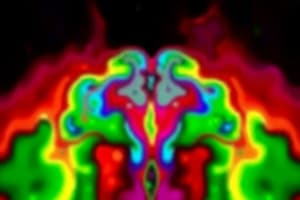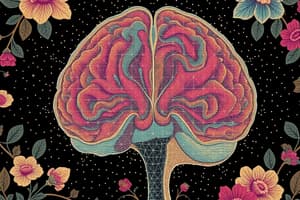Podcast
Questions and Answers
What is cognitive neuroscience?
What is cognitive neuroscience?
- The study of the mind
- The study of biological processes and neural connections in the brain that underlie cognition (correct)
- The study of the nervous system
- The study of the structure of the brain
Which disciplines overlap in cognitive neuroscience?
Which disciplines overlap in cognitive neuroscience?
- Cognitive psychology, physiological psychology, affective neuroscience, and social psychology
- Developmental psychology, social psychology, physiological psychology, and cognitive psychology
- Behavioral neuroscience, cognitive psychology, social psychology, and clinical psychology
- Behavioral neuroscience, cognitive psychology, physiological psychology, and affective neuroscience (correct)
What are the methods employed in cognitive neuroscience?
What are the methods employed in cognitive neuroscience?
- Functional neuroimaging, phrenology, cognitive genomics, and behavioral genetics
- Functional neuroimaging, electrophysiology, cognitive genomics, and behavioral genetics (correct)
- Phrenology, cognitive genomics, behavioral genetics, and electrophysiology
- Behavioral genetics, electrophysiology, cognitive genomics, and phrenology
Why are studies of patients with cognitive deficits due to brain lesions important in cognitive neuroscience?
Why are studies of patients with cognitive deficits due to brain lesions important in cognitive neuroscience?
What does the subfield of developmental cognitive neuroscience examine?
What does the subfield of developmental cognitive neuroscience examine?
What is the adaptive resonance theory (ART)?
What is the adaptive resonance theory (ART)?
What is optogenetics?
What is optogenetics?
What topics has cognitive neuroscience explored?
What topics has cognitive neuroscience explored?
What are some applications of cognitive neuroscience?
What are some applications of cognitive neuroscience?
Flashcards
What is cognitive neuroscience?
What is cognitive neuroscience?
The study of the brain's biological processes and neural connections that are responsible for our thoughts, feelings, and behaviors.
What is developmental cognitive neuroscience?
What is developmental cognitive neuroscience?
A field that examines how the brain changes and develops over time, focusing on how cognitive abilities emerge and mature.
How do brain mapping techniques help us understand cognition?
How do brain mapping techniques help us understand cognition?
Techniques like fMRI and PET scan, which monitor brain activity during tasks, allowing researchers to see which areas are active for specific functions.
What is the localizationist view?
What is the localizationist view?
Signup and view all the flashcards
What is phrenology?
What is phrenology?
Signup and view all the flashcards
What is optogenetics?
What is optogenetics?
Signup and view all the flashcards
Why are studies of brain lesions important?
Why are studies of brain lesions important?
Signup and view all the flashcards
What makes cognitive neuroscience interdisciplinary?
What makes cognitive neuroscience interdisciplinary?
Signup and view all the flashcards
What are some current trends in cognitive neuroscience?
What are some current trends in cognitive neuroscience?
Signup and view all the flashcards
Study Notes
Overview of Cognitive Neuroscience
-
Cognitive neuroscience is a scientific field concerned with the study of biological processes and neural connections in the brain that underlie cognition.
-
The field involves overlapping disciplines, such as behavioral neuroscience, cognitive psychology, physiological psychology, and affective neuroscience.
-
Methods employed in cognitive neuroscience include functional neuroimaging, electrophysiology, cognitive genomics, and behavioral genetics.
-
Studies of patients with cognitive deficits due to brain lesions are important in cognitive neuroscience, as they provide a comparable starting point for healthy brains.
-
The subfield of developmental cognitive neuroscience examines brain development over time.
-
Theoretical approaches in cognitive neuroscience include computational neuroscience and cognitive psychology.
-
Phrenology, a pseudoscientific approach based on the shape of the scalp, was one of the predecessors to cognitive neuroscience.
-
The localizationist view, which proposed that mental abilities were localized to specific areas of the brain, was supported by studies of patients with brain damage.
-
Brain mapping techniques, such as fMRI and PET, allowed researchers to investigate cognitive psychology by observing brain function.
-
The term cognitive neuroscience was coined in 1976 by Gazzaniga and cognitive psychologist George Armitage Miller.
-
Adaptive resonance theory (ART) is a cognitive neuroscience theory that addresses problems such as pattern recognition and prediction.
-
Notable figures in cognitive neuroscience include Stanislas Dehaene, Giacomo Rizzolatti, Trevor Robbins, Brenda Milner, Marcus Raichle, and John O'Keefe.Trends and Topics in Cognitive Neuroscience
-
Research in cognitive neuroscience has expanded from localization of brain areas for specific functions to exploring interactions between different areas, using multiple technologies, and computational approaches.
-
Non-invasive functional neuroimaging and data analysis methods have made it possible to study naturalistic stimuli and tasks such as feature films in cognitive neuroscience studies.
-
Optogenetics is a recent trend in cognitive neuroscience that uses light to explore circuit function and its behavioral consequences.
-
The methods used in experimental cognitive neuroscience include fMRI, EEG, TMS, and optogenetics.
-
Cognitive neuroscience has contributed to the understanding of disorders of decision-making in conditions such as gambling, drug addiction, compulsive behavior, and schizophrenia.
-
Research in cognitive neuroscience has also explored topics such as consciousness, attention, perception, memory, and language.
-
Cognitive neuroscience has contributed to the understanding of brain development and the effects of environmental factors on brain function.
-
Cognitive neuroscience has also explored the neural mechanisms underlying social behavior, decision-making, and emotion.
-
Notable figures in cognitive neuroscience include Antonio Damasio, Michael Gazzaniga, and Daniel Kahneman.
-
Cognitive neuroscience has applications in fields such as medicine, education, and technology.
-
Cognitive neuroscience has also raised ethical and philosophical questions about the nature of consciousness and human cognition.
-
Cognitive neuroscience is an interdisciplinary field that draws on neuroscience, psychology, philosophy, computer science, and other disciplines.
Studying That Suits You
Use AI to generate personalized quizzes and flashcards to suit your learning preferences.





